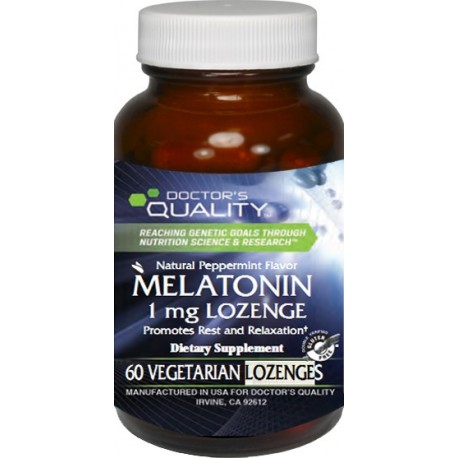No products
Melatonin 1 mg Lozenge
New product
Melatonin has the following benefits:
- Promotes rest and relaxation
- Provides antioxidant support
100 Items
More info
Indications
Melatonin has the following benefits:
- Promotes rest and relaxation
- Provides antioxidant support
Melatonin Background and Application
Melatonin is a hormone naturally produced and secreted in the brain. It was discovered in 1958 by dermatologist Aaron Lerner, when he observed the whitened skin of tadpoles exposed to bovine pineal extracts. The name melatonin was thus derived from its ability to lighten melanocytes (skin cells that produce melanin, or pigments). Melatonin is also found in smaller amounts in walnuts and in some fruit and vegetables.
The synthesis and release of melatonin are stimulated by the absence of light and inhibited by light, suggesting this hormone’s involvement in the circadian rhythm and regulation of many body functions. Melatonin levels in the blood peak prior to bedtime. Many consume the synthetic dietary supplement form orally to provide external sleep regulation.2
Mechanism of action
Melatonin is produced and secreted by the pineal gland in the brain, in response to darkness. The serum melatonin levels reflect a circadian rhythm set by the internal “clock” in the hypothalamus named the suprachiasmatic nucleus (SCN). The clock is set to a 24-hour schedule regulated by light channeled through the retina to the brain where the signals are received. Dark messages send a signal to the brain to release more melatonin, whereas light signals impeded synthesis1. Melatonin helps regulate reproductive, behavior and weight changes in seasonally breeding animals. A precursor for melatonin production, L-tryptophan (an essential amino acid) is converted to 5-hydroxytryptophan, which becomes 5-hydroxtryptamine or more commonly known as serotonin. Serotonin is then converted to melatonin.
Antioxidant Protection
There are over 100 laboratory and animal studies showing the antioxidant capabilities of melatonin. Melatonin possesses antioxidant activity1,,3,4 including inhibiting peroxidation of lipids induced by hyperhomocysteinemia4. Thus, supplements of melatonin have been proposed as a way to prevent or treat various conditions associated with free radical damage.3
Jet Lag and Sleep Disorders
Several human research studies suggest melatonin supplements commencing on the day of travel (near bedtime at the destination) and continued for several days reduces the number of days required to establish normal sleep patterns, lessens the time it takes to fall asleep, improves alertness and sleep quality, and diminishes daytime fatigue.2 Research shows that by supplementing melatonin to raise serum levels enough to mirror nocturnal levels, sleep may be induced. One study used 34 subjects who habitually used benzodiazepine for sleep support1. The double-blind, placebo-controlled study used 2 mg of melatonin for two groups either continuing or discontinuing concomitant benzodiazepine use. Sleep quality scores were significantly higher in the group receiving melatonin versus placebo. After six months, 19 out of 24 subjects who stopped the drug but kept melatonin maintained a high sleep quality.
Our Product & Dosage
One lozenge provides 1 mg of melatonin. A wide range of doses has been used taken by mouth 30 to 60 minutes before bedtime. The suggested dosage in the Physician’s Desk Reference is 0.3 to 3 mg per day, for no more than 2 weeks, unless under medical supervision. Research suggests exceeding 20 mg may have the opposite effect, as one study found that 5 mg was effective in sleep but 20 mg was not.
Specifications
Product Name: Melatonin 1 mg Lozenge
Label Claim: Promotes Rest and Relaxation
How Supplied: Small vegetarian lozenge
Drop Count: 60 ct
Product Code: VL447
References
- The Physician’s Desk Reference for Nutritional Supplements, 2001. Medical Economics Company, Inc. Montvale, NJ.
- MedlinePlus (U.S. National Institutes of Health) website, Melatonin webpage, as viewed on December 23, 2008: http://www.nlm.nih.gov/medlineplus/druginfo/natural/patient-melatonin.html
- Akcay YD, et al. Nov 2005;Vol 10:321-329 Cellular & Molecular Biology Letters.
- Baydas G., et al. Jun 7 2005;1046(1-2):187-94. Brain Research



